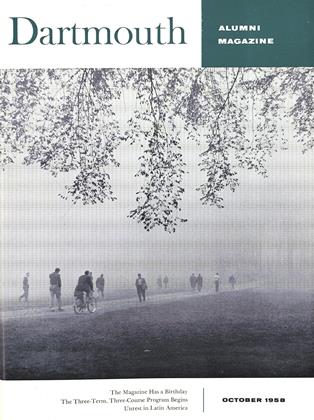By Dr. Seuss (Theodore S.Geisel '25). New York: Random House,1958. 72pp. $2.95.
A book about Dr. Seuss could be called "The Clock that Never Runs Down" or "The Well that Never Goes Dry." Take your choice (or add one of your own), but while you are at it, don't forget to look at the latest "Yertle the Turtle." Reprinted from Redbook, here are three fine tales, each with an equally fine moral, so delightfully concealed that the child reader will learn by osmosis. They are flippant, effective, enchanting twentieth-century versions of La Fontaine, though done in a manner that would make La Fontaine shudder. Which, of course, endears them to Mrs. 1958 and her children.
The turtle king Yertle learns the hard way that his subjects have rights. It seems a little sad that such magnificent aims should be undone by such a small thing (read and find out), thus toppling Yertle from his seat on a pile of two hundred anguished subjects. In the second tale, Gertrude McFuzz caused misery only to herself when she tried, female fashion, to outshine her rival's tailfeathers. A small worm, in the Big Brag, brings two boasters down to size.
By now you should be familiar with the general style and pictures in these books, but it does no harm to remind you that the text is in verse which goes bucketing merrily along in its own original fashion. It will pay you to spend a little time studying the illustrations. Their imaginative effect is immediately seen, but a closer glance will show delightful details in expression and attitude. The two combine into a most satisfactory unit.
My favorite is the portion showing Gertrude McFuzz and her new tail. The latter is a most formidable thing. The verse is a wonderful conglomeration of appropriate, if unusual, combinations such as diamonds and gumdrops. Who could do better than that? Just wait, Dr. Seuss is the man for it.
 View Full Issue
View Full Issue
More From This Issue
-
 Feature
FeatureUnrest in Latin America
October 1958 By RICHARD B. McCORNACK -
 Feature
FeatureThe Magazine Has A Birthday
October 1958 By C.E.W. -
 Feature
FeatureHIS JOB Is Running Rockefeller Center
October 1958 By JAMES B. FISHER '54 -
 Feature
FeatureIndependence in Learning
October 1958 -
 Class Notes
Class Notes1953
October 1958 By LT. FREDERICK H. STEPHENS JR., CHARLES B. BUCHANAN -
 Class Notes
Class Notes1921
October 1958 By JOHN HURD, LINCOLN H. WELD
MAUDE D. FRENCH
-
 Books
BooksIF I RAN THE ZOO,
January 1951 By MAUDE D. FRENCH -
 Books
BooksIN CLEAN HAY.
January 1954 By MAUDE D. FRENCH -
 Books
BooksHORTON HEARS A WHO!
December 1954 By MAUDE D. FRENCH -
 Books
BooksTHE ENORMOUS EGG.
May 1956 By MAUDE D. FRENCH -
 Books
BooksDR. SEUSS' SLEEP BOOK.
DECEMBER 1962 By MAUDE D. FRENCH -
 Books
BooksHOP ON POP.
APRIL 1963 By MAUDE D. FRENCH
Books
-
 Books
BooksAlumni Articles
January 1956 -
 Books
BooksTORO! TORO! TORO!
December 1974 By J.D.O'HARA '53 -
 Books
BooksJOOP'S DANCE.
JANUARY 1970 By JOHN J. KANE -
 Books
BooksPeace and War
DECEMBER 1983 By Peter Smith -
 Books
BooksGood Timing
SEPTEMBER 1983 By Thomas L. Berger '63 -
 Books
BooksALGEBRA AND TRIGONOMETRY.
JUNE 1967 By WILLIAM R. COGSWELL '61

